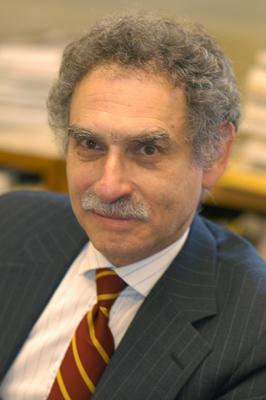Hadley Arkes, the Edward N. Ney Professor in American Institutions (Political Science), has been named the director of a new Washington, D.C.-based institute inspired by his writings and lectures. In addition, content from his lectures at Amherst is now commercially available as audio recordings.
The Center for the Jurisprudence of Natural Law, with the mission of restoring natural law to the central place in American constitutional jurisprudence, was launched at a gathering in Washington in June 2011, with Arkes presenting “A Natural Law Manifesto.” Through seminars, public speeches, writings and the John Marshall Fellowship, the Center seeks to convince current and future jurists, lawyers and academics that the understanding of natural law—the idea that morality is a function of human nature, discoverable by reason—ought to guide legal minds, especially in interpretation of the U.S. Constitution.
Support for the new center comes from the Claremont Institute, a conservative think tank based in Claremont, Calif., and from Thomas Klingenstein, chair of the Claremont Institute’s board of directors and principal in the investment firm of Cohen Klingenstein LLC. Klingenstein and Brian Kennedy, president of the Claremont Institute, approached Arkes in 2010 about backing a series of lectures, seminars and possibly research.

To date, the new Center has held two seminars in Washington, bringing together federal judges and accomplished professors and writers. In August, the institute hosted a weeklong seminar in Newport Beach, Calif., for young lawyers. Most of these participants are on their way to clerkships in federal courts, and one on the way to the Supreme Court, Arkes said. The sessions, based on courses Arkes teaches at Amherst, have touched on subjects such as the moral grounding of the law and the difference between natural rights and legal positivism as presented in the Lincoln-Douglas debates.
“By the end of the week, these accomplished young lawyers wanted to stay on as Marshall Fellows,” Arkes said.
The Center also hosts a website, Right Reason, which carries news of the Center and is the home of a new Web journal and archive for some of Arkes’ recent writings.
Arkes has been a member of the Amherst College faculty since 1966. He has written five books with Princeton University Press: Bureaucracy, the Marshall Plan, and the National Interest (1972), The Philosopher in the City (1981), First Things (1986), Beyond the Constitution (1990) and The Return of George Sutherland (1994). His most recent books have been with Cambridge University Press, including Natural Rights and the Right to Choose (2002) and Constitutional Illusions & Anchoring Truths: The Touchstone of the Natural Law (2010).
Arkes will continue to teach fall-semester courses at Amherst over the next three years as he makes the transition to living and working in Washington. He said he hopes to bring some of his students from Amherst, such as those involved in his Committee for the American Founding, into the work of the new Center.
“We’ve placed some of our very best students in the chambers of some stars of the federal bench, even while the students are undergraduates,” he said.
Themes from Arkes’ signature course at Amherst, “Political Obligations,” which were the basis of First Things, have now been developed into audio recordings being released by Recorded Books, LLC, as part of its Modern Scholars series, under the title First Principles and Natural Law: The Foundations of Political Philosophy. Part I (available as four 35-minute disks or a download) is out now, and Part II is coming later this fall.
“They are not strictly lectures,” said Arkes. “They sound rather like me talking with someone and trying to explain certain things about the grounds of moral judgments and the law.”